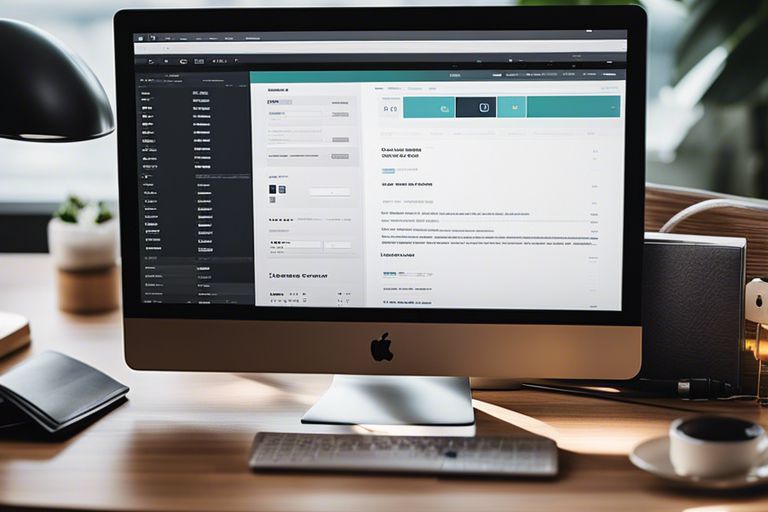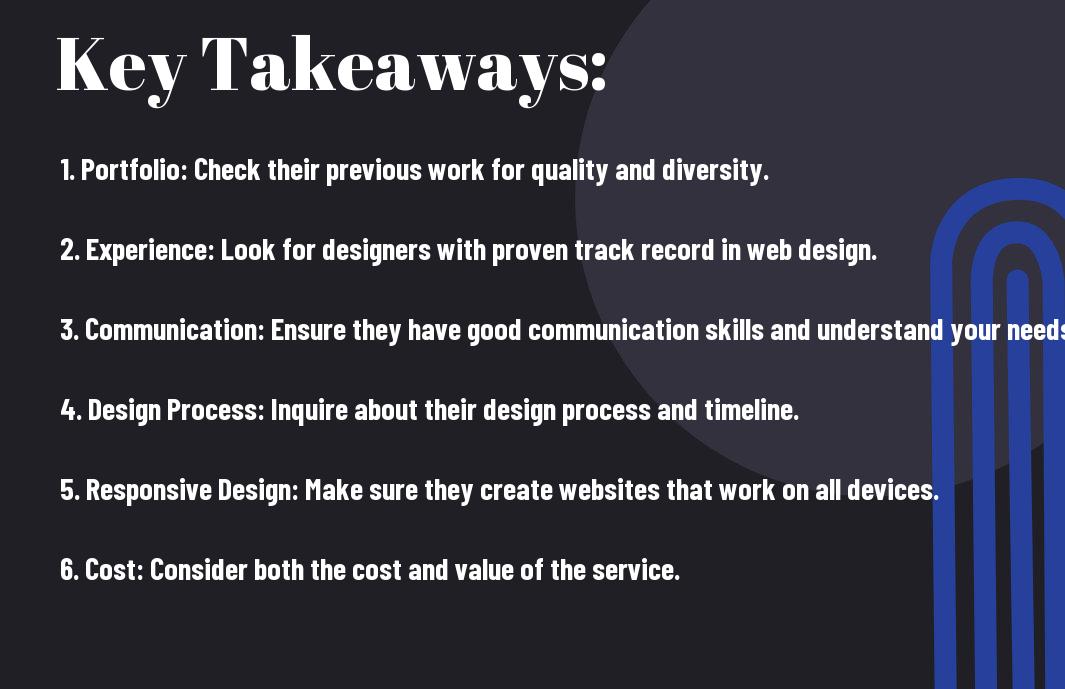When it comes to creating a successful online presence for your business, choosing the right website designer is crucial. You want to ensure that your website not only looks professional but also functions seamlessly and effectively. With so many options out there, it can be overwhelming to find the right designer for your needs. In this blog post, we will discuss the key factors you should consider when selecting a professional website designer, from experience and expertise to portfolio and communication. By the end of this post, you will have a clear understanding of what to look for in a website designer that can meet your business needs and help you stand out in the online world. Whether you’re starting from scratch or looking to revamp your current website, finding the right designer is the first step towards building a successful online presence.
Key Takeaways:
- Technical Expertise: Look for a website designer who has a strong understanding of various programming languages, web development tools, and content management systems.
- Portfolio and Reviews: Check their past work and client testimonials to gauge their design skills, creativity, and ability to meet client expectations.
- Responsive Design Skills: Ensure the designer has experience in creating websites that are mobile-friendly and responsive across different devices and screen sizes.
- SEO Knowledge: A professional website designer should understand the importance of search engine optimization and be well-versed in SEO best practices for website design.
- Good Communication and Collaboration: Choose a designer who is easy to communicate with, understands your goals, and can collaborate effectively to bring your vision to life.


Evaluating Experience and Portfolio
Obviously, when looking for a professional website designer, you want to ensure that they have the necessary experience and a strong portfolio to back it up. Here are a few key things to consider when evaluating a designer’s experience and portfolio.
Analysing Design Skills
When assessing a designer’s experience, pay close attention to their design skills. Look for a designer who has a strong understanding of design principles, such as layout, color theory, and typography. You want someone who can create visually appealing and user-friendly designs that align with your brand and project goals. Be cautious of designers who lack a strong sense of design or rely heavily on templates as this could result in a generic and uninspiring website for your business.
Reviewing Past Projects
Reviewing a designer’s past projects can give you a good indication of the quality of their work and their ability to deliver results. Look for a diverse portfolio that showcases a range of projects, including different industries and design styles. Pay attention to the functionality and performance of the websites they have created, as well as their visual appeal. Additionally, take note of any positive feedback or testimonials from past clients, as this can provide valuable insight into their professionalism and work ethic.
Technical Expertise and SEO Understanding
Despite the importance of a visually appealing website, hiring a website designer with strong technical expertise and a deep understanding of search engine optimization (SEO) is crucial for the success of your online presence. A professional website designer should possess the ability to not only create a visually stunning website but also ensure that it is technically sound and optimized for search engines.
Mastery of Web Development Technologies
When evaluating a website designer, it’s essential to assess their mastery of web development technologies. You want to ensure that they are proficient in HTML, CSS, JavaScript, and other relevant programming languages. Their expertise in these areas will directly impact the performance and functionality of your website, so be sure to inquire about their experience and knowledge in web development technologies.
Integrating SEO Best Practices
Another crucial aspect to consider when hiring a professional website designer is their ability to integrate SEO best practices into the design and development process. An SEO-friendly website is essential for improving your online visibility and attracting organic traffic. Look for a designer who understands the importance of on-page optimization, site speed, mobile responsiveness, and other SEO factors to ensure that your website ranks well in search engine results.
Assessing Communication and Project Management
For a successful website design project, effective communication and efficient project management are essential. You want to work with a website designer who can clearly understand your goals, preferences, and ideas, and then effectively communicate their plans and progress back to you. To ensure that you and your website designer are on the same page throughout the project, you should ask them thought-provoking questions about their communication style, project management approach, and overall working process. To guide you in this, you can refer to the 25 Questions to Ask Your Website Designer Before Hiring list.
Importance of Effective Communication
Effective communication between you and your website designer is crucial for the success of your project. You need to be able to clearly express your vision and requirements, and your designer needs to be able to understand and interpret them accurately. Regular and transparent communication can prevent misunderstandings, delays, and errors, ensuring that your website design project progresses smoothly. It also fosters a collaborative environment where both parties can contribute ideas and feedback, leading to a more satisfying end result.
Expectations of Timeline and Budget Management
Managing timelines and budgets is a critical aspect of any website design project. Your website designer should be able to provide you with a realistic timeline for the completion of the project and adhere to it as closely as possible. They also need to be transparent about the costs involved and ensure that the project stays within the agreed-upon budget. Clear expectations and ongoing communication about timelines and budget management will help you avoid unpleasant surprises and ensure that the project progresses smoothly and within your financial constraints.
After-Sale Support and Maintenance
Your decision to invest in a professional website designer should not end once the website is launched. After-sale support and maintenance are crucial aspects that you need to consider when choosing a website designer. The level of support and maintenance offered by the designer can greatly impact the performance and longevity of your website.
Offered Post-Launch Support Services
When evaluating a professional website designer, it’s important to inquire about the post-launch support services they offer. This may include assistance with any technical issues that may arise, updates to the website, or troubleshooting any issues that may occur. Some designers may offer ongoing support packages that include regular website backups, security updates, and other essential maintenance tasks. It’s important to ensure that the designer will be readily available to assist you with any post-launch issues that may arise, ensuring the smooth operation of your website.
Ongoing Maintenance and Upgrades
Another important consideration is the designer’s approach to ongoing maintenance and upgrades. A reputable website designer will understand the importance of keeping your website up-to-date and secure. They should offer regular maintenance services, such as updating plugins and themes, monitoring website performance, and implementing any necessary security patches. Additionally, the designer should be proactive in identifying opportunities for upgrades and enhancements to improve your website’s functionality and user experience while keeping it safe from potential security threats.
Conclusion
Hence, when looking for a professional website designer, you should prioritize expertise, creativity, and a strong portfolio. Make sure their previous work aligns with your vision and goals for your website. Additionally, it is crucial to find a designer who is responsive, communicative, and able to meet your deadlines. By focusing on these key aspects, you can ensure that you find a website designer who can bring your vision to life and create a professional, high-quality website that represents your brand effectively. Keep in mind that investing in a skilled website designer is an investment in the success and growth of your business.
FAQ
Q: What should I look for when hiring a professional website designer?
A: When hiring a professional website designer, you should look for a designer with a strong portfolio showcasing a diverse range of websites they have designed. Look for their experience in building websites for businesses similar to yours, as well as their understanding of current design trends and best practices.
Q: Should I consider a designer’s technical skills when choosing a website designer?
A: Yes, it is important to consider a designer’s technical skills when choosing a website designer. Look for someone who is proficient in HTML, CSS, and other coding languages, as well as familiarity with various content management systems and e-commerce platforms.
Q: What role does user experience (UX) play in website design?
A: User experience (UX) is a critical aspect of website design. A professional website designer should have a strong understanding of UX principles and be able to create a website that is easy to navigate, visually appealing, and optimized for conversion.
Q: How important is responsiveness in website design?
A: Responsive design is essential in today’s digital landscape. It ensures that a website functions and displays correctly across various devices and screen sizes. A professional website designer should prioritize responsive design to provide a seamless user experience across all platforms.
Q: What should I expect in terms of ongoing support from a professional website designer?
A: When working with a professional website designer, you should expect ongoing support and maintenance for your website. This may include updates, troubleshooting, and technical assistance to ensure that your website continues to function optimally over time.
